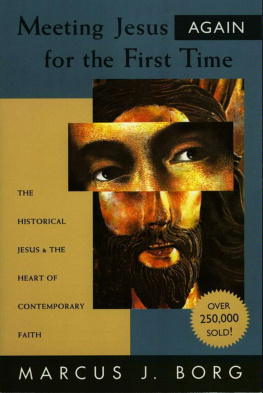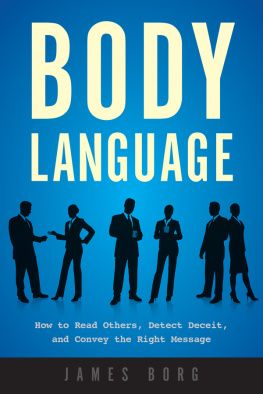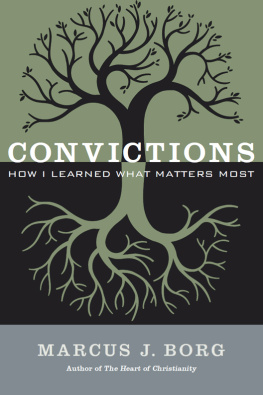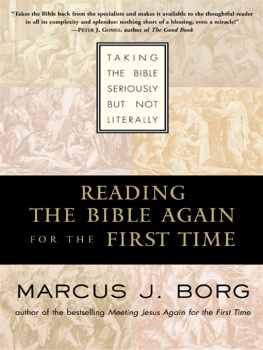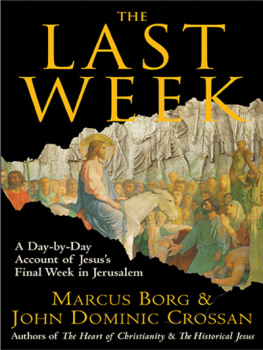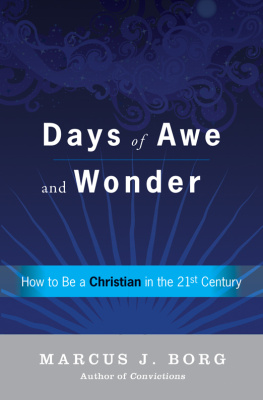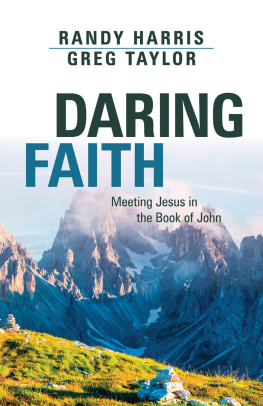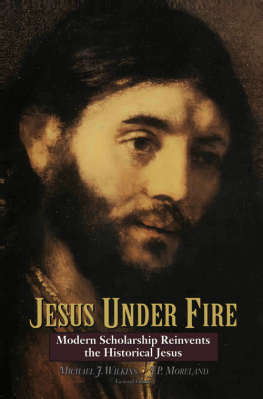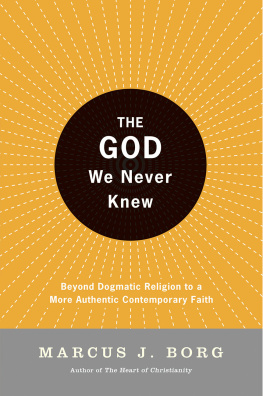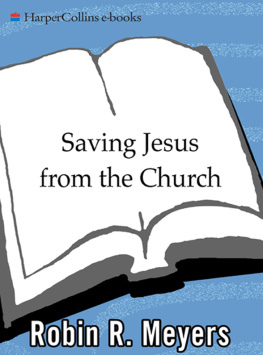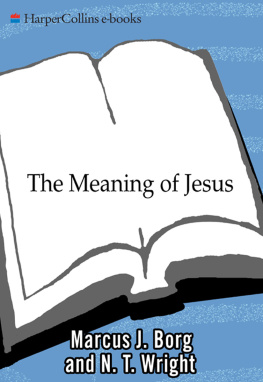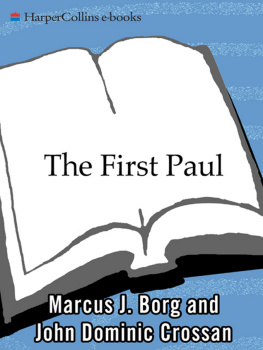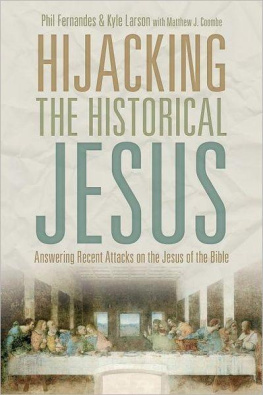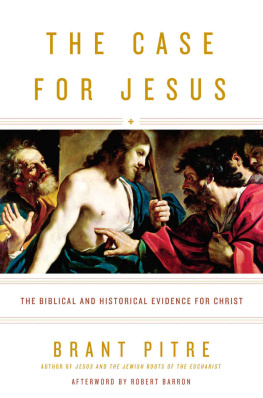Borg - Meeting Jesus Again for the First Time
Here you can read online Borg - Meeting Jesus Again for the First Time full text of the book (entire story) in english for free. Download pdf and epub, get meaning, cover and reviews about this ebook. year: 2014, publisher: HarperCollins e-Books, genre: Religion. Description of the work, (preface) as well as reviews are available. Best literature library LitArk.com created for fans of good reading and offers a wide selection of genres:
Romance novel
Science fiction
Adventure
Detective
Science
History
Home and family
Prose
Art
Politics
Computer
Non-fiction
Religion
Business
Children
Humor
Choose a favorite category and find really read worthwhile books. Enjoy immersion in the world of imagination, feel the emotions of the characters or learn something new for yourself, make an fascinating discovery.
Meeting Jesus Again for the First Time: summary, description and annotation
We offer to read an annotation, description, summary or preface (depends on what the author of the book "Meeting Jesus Again for the First Time" wrote himself). If you haven't found the necessary information about the book — write in the comments, we will try to find it.
Meeting Jesus Again for the First Time — read online for free the complete book (whole text) full work
Below is the text of the book, divided by pages. System saving the place of the last page read, allows you to conveniently read the book "Meeting Jesus Again for the First Time" online for free, without having to search again every time where you left off. Put a bookmark, and you can go to the page where you finished reading at any time.
Font size:
Interval:
Bookmark:



HarperCollins e-book excusive extra
Meeting Jesus Again
What Manner of Man? The Pre-Easter Jesus
Jesus, Compassion, and Politics
Jesus and Wisdom: Teacher of Alternative Wisdom
Jesus, the Wisdom of God: Sophia Become Flesh
Images of Jesus and Images of the Christian Life
HarperCollins e-book exclusive extra
The Truth of Easter
By Marcus J. Borg
Excerpted from The Meaning of Jesus: Two Visions
by Marcus J. Borg and N.T. Wright (HarperSanFrancisco, 1999)
THE TRUTH OF EASTER
E ASTER STARTLES US. Into the story of Jesus it introduces post-death experiences plus the extraordinary affirmation that a Galilean Jewish peasant is Lord, claiming our allegiance and participating in the power and being of God. In this chapter, I will treat what I see as the central meanings of Easter, including how I see the historical ground of Easter, and then explore the meanings that early Christianity saw in the combined pattern of Jesus death and resurrection.
THE CENTRALITY OF EASTER
Easter is utterly central to Christianity. God raised Jesus from the dead is the foundational affirmation of the New Testament. About this Tom and I agree. We also agree that the best explanation for the rise of Christianityindeed, the only adequate explanationis the resurrection of Jesus. We also agree about its central meanings. Put most compactly, I see the meanings of Easter as twofold: Jesus lives, and Jesus is Lord. Both claims are essential: Easter means that Jesus was experienced after his death, and that he is both Lord and Christ. Though each of us might add further subpoints of meaning, we agree about all of the above.
THE HISTORICAL GROUND OF EASTER
What we disagree about is the historical ground of those affirmations. What lies behind the Easter traditions of the New Testament? What happened? Specifically, we disagree about whether the truth of Easter depends upon an empty tomb. Did something utterly remarkable happen to the corpse of Jesus so that the tomb was empty? And how much does that matter? Equally basic to our disagreement is how we are to understand the gospel stories of the empty tomb and the appearances of the risen Christ. Are we to understand these stories as reporting the kinds of events that could have been videotaped, if one had been there with a videocamera? That is, are these the kinds of events that disinterested observers could have seen had they been present? And these historical questions lead to an interpretive theological question: does the truth of Easter depend upon the empty tomb and appearance stories being historically factual in this objective sense?
We answer these questions differently. Tom argues vigorously for the historical factuality of the empty tomb and sees it as central to the truth of Easter. He thus affirms what is commonly called a physical resurrection: something utterly remarkable did happen to the corpse of Jesus, namely, it was transformed into a new mode of physicality. I see the empty tomb and whatever happened to the corpse of Jesus to be ultimately irrelevant to the truth of Easter. Tom sees the gospel stories of Easter (empty tomb and appearance stories alike) as ultimately going back to multiple eyewitnesses. If I understand him correctly, once could have videotaped what the gospel eyewitnesses saw if one had been there. I see them as the product of a developing tradition and as powerfully true metaphorical narratives.
THE IRRELEVANCE OF THE EMPTY TOMB
Within the framework of our broader agreement, I will begin with our different views of the historical ground of Easter. My understanding of Easter has changed over the course of my lifetime. Not just deepened (I trust), but changed. My childhood memories include singing the great Easter hymns, their melody lines as triumphant as their words. My favorite was (and is) Christ the Lord is Risen Today. Its glorious, repeating alleluias are as wonderful as ever. Almost as vivid in my memory is Up from the Grave He Arose, its ascending notes emulating the rising of Christ himself. As a child, I took it for granted that Easter meant that Jesus literally rose from the tomb.
I now see Easter very differently. For me, it is irrelevant whether or not the tomb was empty. Whether Easter involved something remarkable happening to the physical body of Jesus is irrelevant. My argument is not that we know the tomb was not empty or that nothing happened to his body, but simply that it doesnt matter. The truth of Easter, as I see it, is not at stake in this issue.
There are three major reasons. The first is a crucial distinction between two words that are often confused: resuscitation and resurrection. The meaning of resuscitation is obvious: a person dead or believed to be dead comes back to life again. Such a person returns to the life she or he had before, needs to eat and drink and sleep, and will die again someday. Resuscitation is resumption of previous existence.
Resurrection in a first-century Jewish and Christian context is a very different notion. Put compactly and somewhat abstractly, resurrection does not mean resumption of previous existence but entry into a new kind of existence. We cannot say in detail what this new existence is like, but it is obviously an existence very different from what we presently experience. In a sense, it is beyond the categories of life and death, for a resurrected person will not die again. There is a sense in which it is also beyond the categories of space and time; the resurrected Christ can appear anywhere and presumably can appear in more than one place at the same time. Thus, whatever happened on Easter, it was not resuscitation.
To apply this distinction: resuscitation intrinsically involves something happening to a corpse; resurrection need not. Resurrection does not refer to the resumption of protoplasmic or corpuscular existence. To be sure, resurrection could involve something happening to a corpse, namely the transformation of a corpse; but it need not. Thus, as a Christian, I am very comfortable not knowing whether or not the tomb was empty. Indeed, the discovery of Jesus skeletal remains would not be a problem. It doesnt matter, because Easter is about resurrection, not resuscitation.
Three features of that complex chapter are important for the current point. Two are found near the beginning of the chapter, in Pauls summary of the tradition that he had received:
For I handed on to you as of first importance what I in turn had received: that Christ died for our sins in accordance with the scriptures, and that he was buried, and that he was raised on the third day in accordance with the scriptures, and that he appeared to Cephas (Peter), then to the twelve. Then he appeared to more than five hundred brothers and sisters at one time, most of whom are still alive, though some have died. Then he appeared to James, then to all the apostles. Last of all, as to one untimely born, he appeared also to me.
The first point to note is that Paul does not mention an empty tomb. The absence may or may not be significant. Perhaps, as some argue, the reference to buried implicitly points to an empty tomb, though it could also be a way of saying, He was really dead. In any case, Paul does not say, And on the third day, they found the tomb empty.
Font size:
Interval:
Bookmark:
Similar books «Meeting Jesus Again for the First Time»
Look at similar books to Meeting Jesus Again for the First Time. We have selected literature similar in name and meaning in the hope of providing readers with more options to find new, interesting, not yet read works.
Discussion, reviews of the book Meeting Jesus Again for the First Time and just readers' own opinions. Leave your comments, write what you think about the work, its meaning or the main characters. Specify what exactly you liked and what you didn't like, and why you think so.

